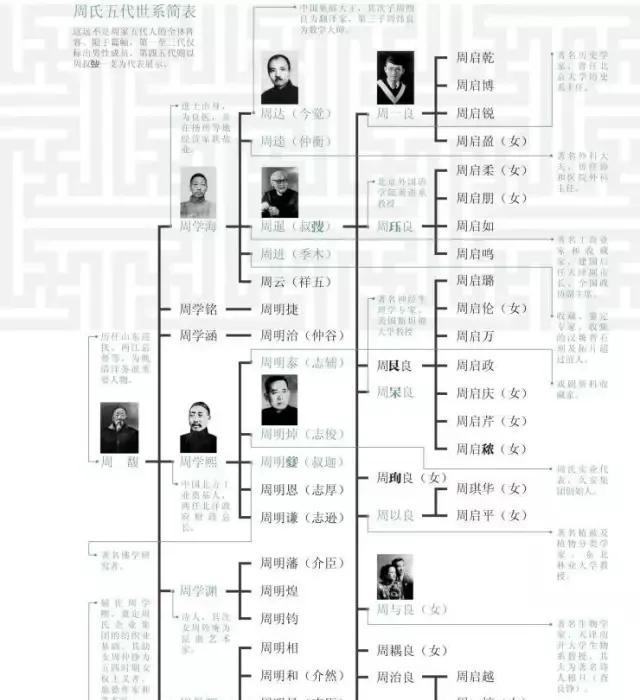
Zhou Fu (1837 – September 22, 1921) was a native of Zhide, Anhui (present-day Dongzhi, Anhui). Before the Battle of Jia-Wu, he was appointed Prime Minister of the Enemy Camp Affairs Office. He cooperated with Li Hongzhang in establishing foreign affairs for more than thirty years, and played a role in the establishment of the Beiyang Navy, the Wubei Academy, the Tianjin Telegraph Bureau, and the Kaiping Coal Mine. He helped open Fudan Public School (the predecessor of Fudan University) and Anhui Public School, contributing to education.
The eldest son, Zhou Xuehai (1856--1906), was a late Qing dynasty official and medical scientist. Jinshi , successively appointed as the secretary of the cabinet, Zhejiang alternate Dao. After studying medicine, he was a very accomplished medical scientist.
The second son, Zhou Xueming (1859-1911), was a jinshi and his younger brother, and successively served as an alternate province in Zhixian and Jiangxi, an envoy in Jiangxi, and an alternate in Hunan. Editor-in-chief of Jiande County Chronicle.
The third son, Zhou Xuehan, died early.
The fourth son, Zhou Xuexi (1866-1947), was a famous industrialist and politician in modern China. Officials are pressed to the inspectors. Founder of Kailuan Mining Bureau, Qixin Yang Gray Company, Huaxin Textile Company and Yaohua Glass Company. The first president of Shandong University. Commodity exhibition hall, botanical garden, Tianjin Iron Factory, Luanzhou Coal Mining Company, Tianjin Mint, Tangshan Qixin Yang Ash Company, Tianjin Higher Industrial School, etc.
Wuzi Zhou Xueyuan (1878-1953) poet and educator. Official to three products. He has successively served as the alternate Dao of Shandong, the supervisor (principal) of Shandong Higher School and Shandong Normal School, and the general office of Shandong Investigation Bureau. He is good at poetry and painting, and is the author of "Late Red Xuan Poetry".
The sixth son, Zhou Xuehui (1882-1971), was a member of the Senate and a member of the House of Representatives during the Republic of China. He has successively served as the executive chairman of Tianjin Huaxin Spinning Factory, the executive chairman of Beijing Water Supply Company, the chairman of Luanzhou Mining Company, the chairman of Qixin Yang Ash Company, the director of Jiangnan Cement Company, and the director of Yaohua Glass Company. After the founding of new China, he served as a member of the Third Tianjin Municipal Committee of the Chinese People's Political Consultative Conference.
Grandson Zhou Jinjue, son of Zhou Xuehai. He was the president of the Chinese Stamp Society and a director of the Chinese Mathematical Society.
Grandson Zhou Shuhan (1891-1984) was the son of Zhou Xuehai. Collector of ancient Chinese books, collector of cultural relics, politician, industrialist, collector.
Grandson Zhou Jimu (1893-1937) Zhou Xuehai's fourth son. Famous collector and member of the archaeological society.
Grandson Zhou Mingtai (1896-1994) was the son of Zhou Xuexi. He was the secretary of the Presidential Office of the Beiyang Government and a counselor of the Ministry of Internal Affairs. Loves opera.
Grandson Zhou Zhifu, the eldest son of Zhou Xuexi. Industrialist, collector.
Grandson Zhou Zhijun (1898-1990) was the second son of Zhou Xuexi. A democrat, he was a former member of the National Committee of the Chinese People's Political Consultative Conference.
Grandson Zhou Shujia, the third son of Zhou Xuexi. Modern Buddhist scholar. He has served as a professor at Peking University and Tsinghua University, and the dean of Buddhist College of China.
Great-granddaughter Zhou Zhifu (1913-) daughter of Zhou Jinjue. Celebrities of the Republic of China.
Great-grandson Zhou Zhenliang, the eldest son of Zhou Jinjue, collector, professor of the Department of Electrical Engineering of Shandong Institute of Technology.
Great-grandson Zhou Xuliang (1905–1984) was the second son of Zhou Jinjue. Literary translator, poet, writer, professor.
Great-grandson Zhou Weiliang (October 1, 1911 – August 10, 1995) was the third son of Zhou Jinjue. Famous Chinese mathematician. Academician of the Central Research Institute.
Great-grandson Zhou Zhouliang (1913–2001) was the eldest son of Zhou Shutao. Chinese historian.
Great-grandson Zhou Jueliang (1916-1992) was the second son of Zhou Shuhan. Translator, member of the Communist Party of China, professor.
Great-grandson Zhou Genliang, the third son of Zhou Shutao. Architectural design expert.
Great-grandson Zhou Gaoliang, zhou shutao's fourth son. Professor, Department of Neurology, Stanford University School of Medicine, USA.
Great-grandson Zhou Yiliang, zhou uncle Tao's fifth son. Professor, forest botanist.
Great-grandson Zhou Zhiliang, the sixth son of Zhou Shutao. He was the chief architect of the Beijing Asian Games.
Great-grandson Zhou Jingliang, the seventh son of Zhou Shutao. He is a researcher at the Institute of Physics, Chinese Academy of Sciences, and the director of the Analysis and Testing Committee of the Geological Society of Beijing.
Great-granddaughter Zhou Youliang (1923-2002) was the second daughter of Zhou Shutao. Professor, famous microbiology expert, the main founder of the microbiology discipline of Nankai University. Her husband is the famous poet Mu Dan (Zha Liangzheng), and Mu Dan's cousin is the martial arts novelist Jin Yong.
Great-grandson Zhou Shaoliang (1917-2005) was the son of Zhou Shujia. Famous red scholars, Dunhuang scholars, Buddhist scholars, literary historians, collectors, cultural relics appraisal experts.
Grandson Zhou Qiqian (1939--) son of Monday Liang. Researcher of Tianjin Academy of Social Sciences.
Granddaughter Zhou Qipeng (1944--) daughter of Zhou Yuliang. Professor, doctoral supervisor, social science expert who enjoys special government allowances.
Granddaughter Zhou Qihua (1940-2005) was the daughter of Zhou Yiliang. singer.
Son-in-law Yuan Kezhen, the eighth son of Yuan Shikai.